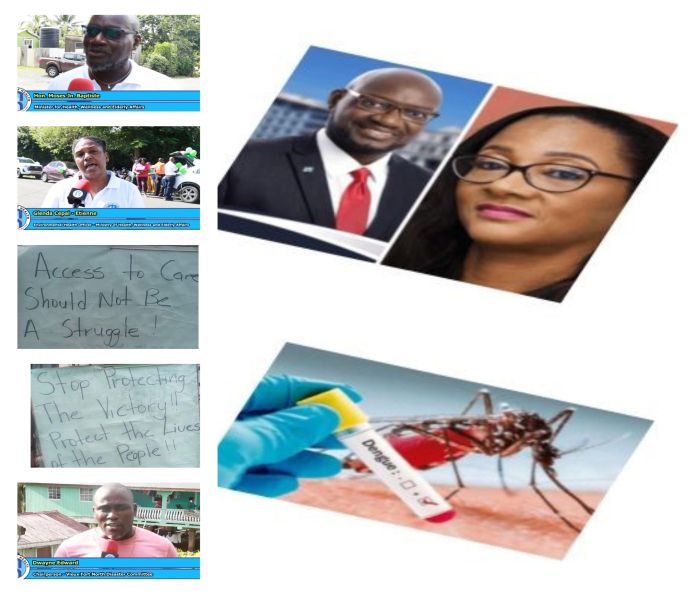By Caribbean News Global contributor
CASTRIES, St Lucia – Saint Lucia has an ongoing health concern related to vector-borne diseases. As such, health officials from the Ministry of Health, Wellness, and Elderly Affairs (MOH) in collaboration with the environmental health division, took to the streets of Vieux Fort North on Sunday, November 3, 2024 to host a Mosquito Awareness Roadshow, primarily to “engage the local community directly, educating residents on essential vector control measures to reduce mosquito breeding in an effort to protect public health,” says the MOH.

Minister for health, Moses Jn Baptiste expressed deep appreciation for the efforts to assist residents and emphasized on the importance of bringing resources and information directly to affected communities, saying:
“We have a big problem in Saint Lucia and we are trying to warn constituents about the dangers of leaving drums uncovered and the dangers of water collection points or water collection receptacles around their homes. So I’m very happy we are here in the community of Grace, we’ve gone to Vige, Cacao, Pierrot and we’ll go throughout the constituency.”
In September, the MOH declared a dengue fever outbreak, prompting the need to prioritize urgent and efficient response to address the upsurge of dengue cases.
The MOH declaration of a Dengue fever outbreak, through its environmental health division was compounded by an alert (October 4) to a notable increase in reported cases of Hand, Foot, and Mouth Disease (HFMD) across Saint Lucia.

Environmental health officer Glenda Cepal-Etienne explains that in light of the rising cases, the ministry, through its environmental health division, intensified its surveillance efforts and launched widespread community awareness initiatives.
“We see an increase in the mosquito population in many communities and one of the biggest challenges is getting communities involded. So we’ve taken on an initiative where we visit the different communities in an effort to educate them, remind them, so that they can take the initiative to prevent mosquitoes from breeding in their communities involved.”
![]() The Pan American Health Organization (PAHO) during Caribbean Mosquito Awareness Week 2024, kick start regional efforts to prevent and control dengue, chikungunya, and Zika, diseases transmitted by the Aedes aegypti mosquito.
The Pan American Health Organization (PAHO) during Caribbean Mosquito Awareness Week 2024, kick start regional efforts to prevent and control dengue, chikungunya, and Zika, diseases transmitted by the Aedes aegypti mosquito.
The Aedes aegypti mosquito lives inside and around homes and breeds in any container or object that collects water. The mosquito can transmit dengue, chikungunya, and Zika, diseases that can cause fever, joint pain, skin rashes, and, in severe cases, even death.
Several environmental and social factors contribute to the spread of the mosquito, including rising temperatures, the presence of garbage and containers that serve as breeding grounds, as well as weather events.
![]() Vectors are living organisms that can transmit infectious pathogens between humans, or from animals to humans. Many of these vectors are bloodsucking insects which ingest disease-producing microorganisms during a blood meal from an infected host (human or animal) and later transmit it into a new host, after the pathogen has replicated. Often, once a vector becomes infectious, they are capable of transmitting the pathogen for the rest of their life during each subsequent bite/blood meal.
Vectors are living organisms that can transmit infectious pathogens between humans, or from animals to humans. Many of these vectors are bloodsucking insects which ingest disease-producing microorganisms during a blood meal from an infected host (human or animal) and later transmit it into a new host, after the pathogen has replicated. Often, once a vector becomes infectious, they are capable of transmitting the pathogen for the rest of their life during each subsequent bite/blood meal.
Key facts
- Vector-borne diseases account for more than 17 percent of all infectious diseases, causing more than 700 000 deaths annually. They can be caused by either parasites, bacteria or viruses.
- Malaria is a parasitic infection transmitted by Anopheline mosquitoes. It causes an estimated 249 million cases globally, and results in more than 608 000 deaths every year. Most of the deaths occur in children under the age of 5 years.
- Dengue is the most prevalent viral infection transmitted by Aedes mosquitoes. More than 3.9 billion people in over 132 countries are at risk of contracting dengue, with an estimated 96 million symptomatic cases and an estimated 40 000 deaths every year.
- Other viral diseases transmitted by vectors include chikungunya fever, Zika virus fever, yellow fever, West Nile fever, Japanese encephalitis (all transmitted by mosquitoes), tick-borne encephalitis (transmitted by ticks) and Oropouche fever (transmitted by Culicoides flies)
- Many of vector-borne diseases are preventable through protective measures and community mobilization.





